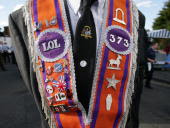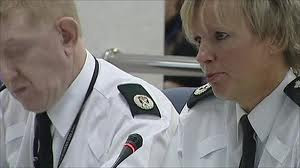You may not have heard it –
you may have been busy greasing the cat’s boil or doing some equally useful
work - but Monday morning last callers
to The Stephen Nolan Show on BBC Radio Ulster/Raidio Uladh were
discussing free will. “Eh?” you say. “A free will phone-in on a Monday morning?
Bit airy-fairy, that”.
Well no, not really. You
see the issue under discussion was whether there should be a ban on smoking in
cars. Nobody was saying it’s good to blow smoke into the lungs of your children
in a confined space; the debate was whether not doing so should be left to our
own free will or whether there ought to be a law.
Big issue, that, because it
boils down to whether we believe doing the right thing is best left to each
individual or whether the state through its laws should pressure us into doing
the right thing.
What do I think? Well, let
me first point you to two public issues that have undergone a total
transformation in my lifetime.
The first is smoking. When
I was young, everybody smoked. The school I went to even had a special shed for
us Big Boys (15 and older) where
we allowed to stand and suck on our Gallahers Blues or Sweet Aftons. As young
adults, when you went into somebody’s house, you automatically reached for the
fags, passed them round. We smoked in cars, in houses, writing, playing poker,
on the toilet, in the pub. If we could have smoked while asleep we would
have. We knew it was damaging us
(we even called them ‘coffin nails’). And now? All changed. Now the few who
still smoke stand huddled outside buildings, indulging their vice and looking miserable.
The other big change has
been in drink-driving. When I first got my licence, the guy who could lower six
or eight pints and then drive home was not exactly a hero but certainly no
villain. He was a laugh, that’s what he was. A rogue. Wobbling all over the
place, God, did you see him! The
notion of phoning for a taxi just because you were half-cut would have sounded
like the actions of a madman. All changed. Now, anybody who drinks and drives is seen as a public menace
who deserves the stiffest of sentences and his licence revoked.
In both cases, the public
opinion turnaround didn’t happen because it was left to people’s free will –
laws were passed that forebade smoking
in pubs and restaurants, other laws were passed which said that if you drank and
got caught behind a car wheel, you’d be a sorry boy or girl. The laws acted as a kind of
scaffolding that made public opinion turnaround possible.
And in politics? Well the
Alliance Party, bless their little cotton socks, have historically urged us all
to be nicer to one another – Trevor Ringland’s “one small step” philosophy
would eventually lead us away from separateness and sectarianism. Nice idea.
But it took the muscle of the McBride principles to persuade employers to end
discrimination, it took laws against incitement to religious hatred to damp
down the uberbigots, it took a
minimum-wage law to make sure employers paid their workers half-properly. Once the law’s in place, of course,
people begin to see that decent pay and non-sectarianism and not poisoning
ourselves make sense. Social responsibility grows after legal protection has
allowed it to emerge.
Otherwise there are always
excuses, aren’t there? Left to our own devices, the drag is downward – we opt
for the easy, the self-pleasuring option. Only after we’ve had a law passed
that protects us from our worst impulses does the public mood change.
But here’s the bad new,
politically speaking. The Good Friday Agreement says that there’ll be a
constitutional change here only when a majority in the north want it. In the
end, the Agreement leaves an end to partition and its attendant absurdities to
a change of political thinking by a sizeable number of unonists.
Do you see signs that, thirteen
years after the Agreement, unionists have started to stop puffing the political
fag in confined spaces or driving the political car while legless? Can’t say
I’ve noticed it myself.
























